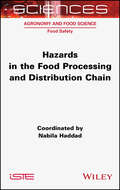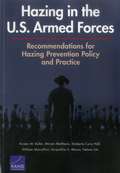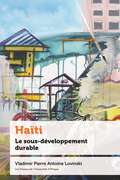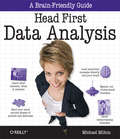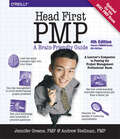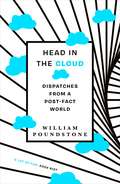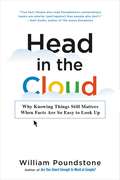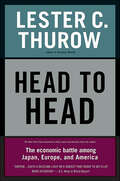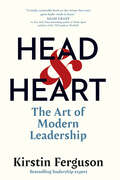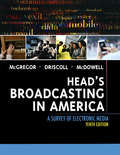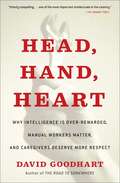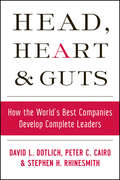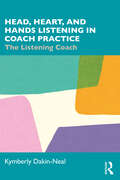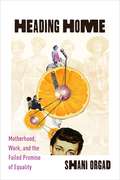- Table View
- List View
Hazards in the Food Processing and Distribution Chain
by Nabila HaddadFoodstuffs can be the vector of a variety of hazards that adversely affect the health of the consumer. Viruses are the leading causes of foodborne infectious diseases, and pathogenic bacteria and bacterial toxins are the leading agents of zoonotic diseases in Europe, not to mention other biological hazards, such as parasites, which can spread to humans through food. In addition to these biological dangers, chemicals used in agriculture, environmental pollutants and additives can all end up on the consumer&’s plate and ultimately damage their health. Hazards in the Food Processing and Distribution Chain covers both chemical and microbiological dangers, aiming to outline the principle of risk analysis with some examples to illustrate the reasoning involved in this process.
Hazards of the Job
by Christopher C. SellersHazards of the Job explores the roots of modern environmentalism in the early-twentieth-century United States. It was in the workplace of this era, argues Christopher Sellers, that our contemporary understanding of environmental health dangers first took shape. At the crossroads where medicine and science met business, labor, and the state, industrial hygiene became a crucible for molding midcentury notions of corporate interest and professional disinterest as well as environmental concepts of the 'normal' and the 'natural.' The evolution of industrial hygiene illuminates how powerfully battles over knowledge and objectivity could reverberate in American society: new ways of establishing cause and effect begat new predicaments in medicine, law, economics, politics, and ethics, even as they enhanced the potential for environmental control. From the 1910s through the 1930s, as Sellers shows, industrial hygiene investigators fashioned a professional culture that gained the confidence of corporations, unions, and a broader public. As the hygienists moved beyond the workplace, this microenvironment prefigured their understanding of the environment at large. Transforming themselves into linchpins of science-based production and modern consumerism, they also laid the groundwork for many controversies to come.
Hazing in the U.S. Armed Forces
by Nelson Lim Kimberly Curry Hall Kirsten M. Keller Jacqueline A. Mauro Miriam Matthews William MarcellinoThis report documents research focused on helping the Department of Defense build a more-systematic approach to hazing prevention and response. The report documents theory and research on the root causes of hazing and findings and recommendations regarding how best to define hazing, practices to prevent and respond to incidents of hazing, and how the armed forces can improve the tracking of hazing incidents.
Haïti: Le sous-développement durable (Politique et politiques publiques)
by M Vladimir Pierre LovinskiAre the priorities of sustainable strategies aligned with the local realities and needs of Haitian society? Are local actors involved in the economic development process? What role does the local community play in collective decision making? Do the ruling class and policy makers have the will to make local development and decentralization an effective reality in Haiti? The foundations of these concepts assume that community, actors, citizens, and authorities should be included in the decision-making process. Aimed to leading to the development of sustainable policies, however, local development planning is difficult to institutionalize. Lovinski’s analysis is based on a multifaceted interpretation of development and takes an institutional approach to public policy. Thereby, prompting an interrogation of sustainable policies prioritized by policy makers. This investigation examines the steps taken to achieve sustainable policies and shows the results and considering the dynamics and their ambiguities.
Head Ball Coach
by Steve Spurrier Buddy MartinCollege football's most colorful, endearing, and successful pioneer, Steve Spurrier, shares his story of a life in football -- from growing up in Tennessee to winning the Heisman Trophy to playing and coaching in the pros to leading the Florida Gators to six SEC Championships and a National Championship to elevating the South Carolina program to new heights -- and coaching like nobody else. He's been called brash, cocky, arrogant, pompous, egotistical, and hilarious, but, mostly, he's known as the Head Ball Coach, a self-ordained term introduced to the lexicon of football by none other than the man, himself, Steve Spurrier. He is the only coach who can claim to be the winningest coach at two different SEC schools, and the only person who has won both the Heisman Trophy as a player and a national championship as a coach. Or who has won a Heisman and coached a Heisman winner.From the beginning, Spurrier didn't want to sound like other coaches, dress like other coaches, and, especially, coach like other coaches. As a controversial football pioneer, he ushered in a different style of leadership and play. Spurrier's press conferences were glorious -- he refused to lapse into coachspeak and was always entertaining, although he took his football very seriously. He was known for his fierce competitiveness, roaming up and down the sidelines, often throwing his signature visor to the ground in disgust. Now resigned from coaching at age 70 -- he doesn't like to say "retired" yet -- Spurrier has calmed down, but don't mistake that for a lack of fire. He can be just as feisty as the day he set foot on the East Tennessee dirt in Johnson City's Kiwanis Park, where he grew up to become one of the state's all-time greatest athletes, and went on to play for Florida where he launched one of sports history's all-time great careers.In his memoir, Spurrier talks for the first time about the circumstances under which he unexpectedly became a coach and why he resigned at South Carolina. He explains his unique style, the difference between winners and losers, his relationship with the media, why he follows the wisdom of ancient philosophers and warriors, his affinity everything taught by John Wooden, and the reasons behind his relaxed regimen for living well. Spurrier, as always, speaks candidly, bringing together his thoughts about his words, actions, and achievements, while telling countless wonderful anecdotes.
Head First Agile: A Brain-Friendly Guide to Agile Principles, Ideas, and Real-World Practices
by Jennifer Greene Andrew StellmanHead First Agile is a complete guide to learning real-world agile ideas, practices, principles.What will you learn from this book?In Head First Agile, you'll learn all about the ideas behind agile and the straightforward practices that drive it. You'll take deep dives into Scrum, XP, Lean, and Kanban, the most common real-world agile approaches today. You'll learn how to use agile to help your teams plan better, work better together, write better code, and improve as a team—because agile not only leads to great results, but agile teams say they also have a much better time at work. Head First Agile will help you get agile into your brain... and onto your team!Preparing for your PMI-ACP® certification?This book also has everything you need to get certified, with 100% coverage of the PMI-ACP® exam. Luckily, the most effective way to prepare for the exam is to get agile into your brain—so instead of cramming, you're learning.Why does this book look so different?Based on the latest research in cognitive science and learning theory, Head First Agile uses a visually rich format to engage your mind, rather than a text-heavy approach that puts you to sleep. Why waste your time struggling with new concepts? This multi-sensory learning experience is designed for the way your brain really works.
Head First Data Analysis: A learner's guide to big numbers, statistics, and good decisions (Head First)
by Michael MiltonToday, interpreting data is a critical decision-making factor for businesses and organizations. If your job requires you to manage and analyze all kinds of data, turn to Head First Data Analysis, where you'll quickly learn how to collect and organize data, sort the distractions from the truth, find meaningful patterns, draw conclusions, predict the future, and present your findings to others.Whether you're a product developer researching the market viability of a new product or service, a marketing manager gauging or predicting the effectiveness of a campaign, a salesperson who needs data to support product presentations, or a lone entrepreneur responsible for all of these data-intensive functions and more, the unique approach in Head First Data Analysis is by far the most efficient way to learn what you need to know to convert raw data into a vital business tool.You'll learn how to:Determine which data sources to use for collecting informationAssess data quality and distinguish signal from noiseBuild basic data models to illuminate patterns, and assimilate new information into the modelsCope with ambiguous informationDesign experiments to test hypotheses and draw conclusionsUse segmentation to organize your data within discrete market groupsVisualize data distributions to reveal new relationships and persuade othersPredict the future with sampling and probability modelsClean your data to make it usefulCommunicate the results of your analysis to your audienceUsing the latest research in cognitive science and learning theory to craft a multi-sensory learning experience, Head First Data Analysis uses a visually rich format designed for the way your brain works, not a text-heavy approach that puts you to sleep.
Head First PMP: A Learner's Companion to Passing the Project Management Professional Exam (Head First Ser.)
by Jennifer Greene Andrew StellmanNow updated for the 2021 PMP Exam What will you learn from this book?Head First PMP teaches you the latest principles and certification objectives in The PMBOK® Guide in a unique and inspiring way. This updated fourth edition takes you beyond specific questions and answers with a unique visual format that helps you grasp the big picture of project management. By putting PMP concepts into context, you'll be able to understand, remember, and apply them--not just on the exam, but on the job. No wonder so many people have used Head First PMP as their sole source for passing the PMP exam.This book will help you:Learn PMP's underlying concepts to help you understand the PMBOK principles and pass the certification exam with flying colorsGet 100% coverage of the latest principles and certification objectives in The PMBOK® Guide, Sixth EditionMake use of a thorough and effective preparation guide with hundreds of practice questions and exam strategiesExplore the material through puzzles, games, problems, and exercises that make learning easy and entertainingWhy does this book look so different?Based on the latest research in cognitive science and learning theory, Head First PMP uses a visually rich format to engage your mind, rather than a text-heavy approach that puts you to sleep. Why waste your time struggling with new concepts? This multi-sensory learning experience is designed for the way your brain really works.
Head Ski Co., Inc.
by Howard H. Stevenson C. Roland ChristensenDescribes the development of the company to its present preeminence in high-priced skis and the avenues that it can follow to obtain new growth.
Head in the Cloud: Dispatches from a Post-Fact World
by William PoundstoneNever before have we had so much information at our fingertips. You might think that we are better-informed than ever, but there&’s one thing we can&’t ask Google: &‘What should I be googling?&’ The way we consume information in the digital age has been blamed for driving political polarisation and leaving us unable to agree on basic facts. It&’s also making us stupider. Personalised news feeds and social media echo chambers narrow our potential knowledge base. By now, we don&’t even know what we don&’t know. In Head in the Cloud, William Poundstone investigates the true worth of knowledge. An entertaining manifesto underpinned by big data analysis and illustrated by eye-opening anecdotes, it reveals the surprising benefits of broadening your horizons and provides an unnerving look at the consequences of being ill-informed.
Head in the Cloud: Why Knowing Things Still Matters When Facts Are So Easy to Look Up
by William PoundstoneThe real-world value of knowledge in the mobile-device age.More people know who Khloe Kardashian is than who Rene Descartes was. Most can't find Delaware on a map, correctly spell the word occurrence, or name the largest ocean on the planet. But how important is it to fill our heads with facts? A few keystrokes can summon almost any information in seconds. Why should we bother learning facts at all?Bestselling author William Poundstone confronts that timely question in HEAD IN THE CLOUD. He shows that many areas of knowledge correlate with the quality of our lives--wealth, health, and happiness--and even with politics and behavior. Combining Big Data survey techniques with eye-opening anecdotes, Poundstone examines what Americans know (and don't know) on topics ranging from quantum physics to pop culture. HEAD IN THE CLOUD asks why we're okay with spelling errors on menus but not on resumes; why Fox News viewers don't know which party controls Congress; why people who know "trivia" make more money than those who don't; how individuals can navigate clickbait and media spin to stay informed about what really matters. Hilarious, humbling, and wildly entertaining, HEAD IN THE CLOUD is a must-read for anyone who doesn't know everything.
Head to Head: The Coming Economic Battle Among Japan, America, and Europe
by Lester C. ThurowEconomicanalysis of international competition.
Head to Head: The Economic Battle Among Japan, Europe, and America
by Lester C. ThurowThe classic text on the post-Cold War economic battle. Starting with the fall of communism, influential economist and former dean of MIT's Sloan School of Management Lester Thurow deftly explores how head-to-head competition -- not military might -- among Japan, the United States, and the newly united European countries would produce the next world leader. As Thurow explains, in the 1990s the race for economic supremacy was only just beginning. In a world no longer governed by two military superpowers, the stage was set for a dramatic shoot-out among the world's most powerful national economies. Using analytical data, key insights, and common sense, Thurow presents a solid economic game plan for the United States to follow in order to win this battle and attain dominance in the global economy.
Head&Heart: The Art of Modern Leadership
by Kirstin FergusonOne of Thinkers50's Ten Best Management Books of 2023A timely, actionable book on the virtues that every great leader needs to learn.—ADAM GRANT, #1 New York Times bestselling author of Think Again and host of the TED podcast WorkLifeLeadership is simply a series of moments, and this book gives you the tools to turn each moment into an opportunity to leave a positive legacy for those you lead.In this ground-breaking book, award-winning leadership expert and business leader Kirstin Ferguson has written a much-needed practical guide for every modern leader. Whether you are the head of one of the largest companies in the world, supervising a small team, or guiding your family, it will be your ability to integrate your head and heart that will influence your success in leading others and navigating our complex world.Combining studies from leading thinkers in the field with her own research, and more than three decades of personal experience, Kirstin explains the 8 key attributes of a head and heart leader and provides the tools to measure your own approach. Along the way, she shares her conversations with modern leaders from a broad range of backgrounds whose stories will surprise you, challenge your thinking and inspire you to be the type of leader the world needs.
Head's Broadcasting in America: A Survey of Electronic Media (1-download)
by Michael A. McGregor Paul D. Driscoll Walter McdowellAfter fifty years of market prominence and incredible demand from loyal users, Head’s Broadcasting in America’s tenth edition returns as the celebrated market leader in its field with its renowned treatment of electronic media as a social force and with a distinguished new author team from Sydney Head's legacy school, the University of Miami. Head’s Broadcasting in America distinguishes itself by presenting electronic media both as products of contemporary social forces and as social forces in their own right. This text will introduce you to the exciting changes taking place in electronic media. It will help you examine the emerging information infrastructure and the accelerating convergence of various electronic media forms. It will also help you explore the role electronic media plays in many academic areas, ranging from economics to law, from history to social science. You will find this industry more accessible as you experience broadcasting dually through the people and the products that have shaped the history of this medium and through your own experiences with broadcasting in your daily life.
Head, Hand, Heart: Why Intelligence Is Over-Rewarded, Manual Workers Matter, and Caregivers Deserve More Respect
by David GoodhartA Financial Times Best Book of the Year 2020 A TIMELY AND PROVOCATIVE ARGUMENT FROM LEADING POLITICAL ANALYST DAVID GOODHART ABOUT THE SEVERELY IMBALANCED DISTRIBUTION OF STATUS AND WORK IN WESTERN SOCIETIES.The coronavirus pandemic revealed what we ought to have already known: that nurses, caregivers, supermarket workers, delivery drivers, cleaners, and so many others are essential. Until recently, this work was largely regarded as menial by the same society that now lauds them as heroes. How did we get here? In his groundbreaking follow-up to the bestselling The Road to Somewhere, David Goodhart divides society into people who work with their Heads (cognitive work), with their Hands (manual work), or with their Hearts (caring work), and considers each group&’s changing status and influence. Today, the &“best and the brightest&” trump the &“decent and hardworking.&” Qualities like character, compassion, craft, and physical labor command far less respect in our workforce. This imbalance has led to the disaffection and alienation of millions of people. David Goodhart reveals the untold history behind this disparity and outlines the challenges we face as a result. Cognitive ability has become the gold standard of human esteem, and those in the cognitive class now shape society largely in their own interest. To put it bluntly: smart people have become too powerful. A healthy democratic society respects and rewards a broad range of achievement, and provides meaning and value for people who cannot—or do not want to—achieve in the classroom and professional career market. We must shift our thinking to see all workers as essential, and not just during crises like the coronavirus pandemic. This is the dramatic story of the struggle for status and dignity in the 21st century.
Head, Heart and Guts: How the World's Best Companies Develop Complete Leaders
by David L. Dotlich Peter C. Cairo Steven H. RhinesmithThis book reveals the three most important capabilities leaders must demonstrate today: the ability to set strategy, empathize with others, and take risksall at the same time. In Head, Heart, and Guts, leadership experts David Dotlich, Peter Cairo, and Stephen Rhinesmithwho teach and coach CEOs and executive teams throughout the worldargue that to be successful in a complex, matrixed, fast-moving world, whole leaders must set strategy, develop trusting relationships with others, and consistently do the right thing based on personal values. Partial leaders, often the product of traditional executive programs, may be successful in the shortrun, but their companies lose over time. Filled with case studies of companies such as Bank of America, Johnson leadership comfort zone and an action plan for companies that want to move beyond tried-and-true leadership development in order to develop whole leaders throughout their leadership pipeline.
Head, Heart, and Hands Listening in Coach Practice: The Listening Coach
by Kymberly Dakin-NealThis book is an exploration of intentional listening as an essential skill for coaches. It introduces the Head, Heart, and Hands Listening model as a vital tool to amplify effective listening in coaching practice. Accessible and applicable, the book explores the three listening modalities of Head, Heart, and Hands as active, though largely unconscious, lenses that inform the potency of our listening. Dakin-Neal argues that once coaches identify "how" they listen, they can assist their clients in more targeted ways to positively impact their personal and professional lives. Chapters are divided into the three listening modalities, Head, Heart, and Hands, and are filled with case studies, stories, reflective questions, and exercises from the author’s experience to help coaches strengthen their listening skills. The book also includes a comprehensive listening assessment for coaches to use in practice. This book is essential reading for coaches in practice and in training as well as organizational psychologists, HR professionals, and those working within corporations.
Heading Home: Motherhood, Work, and the Failed Promise of Equality
by Shani OrgadWomen in today’s advanced capitalist societies are encouraged to “lean in.” The media and government champion women’s empowerment. In a cultural climate where women can seemingly have it all, why do so many successful professional women—lawyers, financial managers, teachers, engineers, and others—give up their careers after having children and become stay-at-home mothers? How do they feel about their decision and what do their stories tell us about contemporary society?Heading Home reveals the stark gap between the promise of gender equality and women’s experience of continued injustice. Shani Orgad draws on in-depth, personal, and profoundly ambivalent interviews with highly educated London women who left paid employment to take care of their children while their husbands continued to work in high-powered jobs. Despite identifying the structural forces that maintain gender inequality, these women still struggle to articulate their decisions outside the narrow cultural ideals that devalue motherhood and individualize success and failure. Orgad juxtaposes these stories with media and policy depictions of women, work, and family, detailing how—even as their experiences fly in the face of fantasies of work-life balance and marriage as an egalitarian partnership—these women continue to interpret and judge themselves according to the ideals that are failing them. Rather than calling for women to transform their feelings and behavior, Heading Home argues that we must unmute and amplify women’s desire, disappointment, and rage, and demand social infrastructure that will bring about long-overdue equality both at work and at home.
Heads I Win, Tails I Win: Why Smart Investors Fail and How to Tilt the Odds in Your Favor
by Spencer JakabINVESTING IS ONE OF THE FEW AREAS IN LIFE WHERE EVEN VERY SMART PEOPLE LET HOPE TRIUMPH OVER EXPERIENCE According to Wall Street Journal investing columnist Spencer Jakab, most of us have no idea how much money we're leaving on the table--or that the average saver doesn't come anywhere close to earning the "average" returns touted in those glossy brochures. We're handicapped not only by psychological biases and a fear of missing out, but by an industry with multimillion-dollar marketing budgets and an eye on its own bottom line, not yours. Unless you're very handy, you probably don't know how to fix your own car or give a family member a decent haircut. But most Americans are expected to be part-time fund managers. With a steady, livable pension check becoming a rarity, we've been entrusted with our own finances and, for the most part, failed miserably. Since leaving his job as a top-rated stock analyst to become an investing columnist, Jakab has watched his readers--and his family, friends, and colleagues--make the same mistakes again and again. He set out to evaluate the typical advice people get, from the clearly risky to the seemingly safe, to figure out where it all goes wrong and how they could do much better. Blending entertaining stories with some surprising research, Jakab explains ·How a typical saver could have a retirement nest egg twice as large by being cheap and lazy. ·Why investors who put their savings with a high-performing mutual fund manager end up worse off than if they'd picked one who has struggled. ·The best way to cash in on your hunch that a recession is looming. ·How people who check their brokerage accounts frequently end up falling behind the market. ·Who isn't nearly as good at investing as the media would have you think. He also explains why you should never trust a World Cup-predicting octopus, why you shouldn't invest in companies with an X or a Z in their names, and what to do if a time traveler offers you economic news from the future. Whatever your level of expertise, Heads I Win, Tails I Win can help you vastly improve your odds of investment success.From the Hardcover edition.
Heads Up Money (DK Heads UP)
by DKDoes money make the world go round? Can wealth buy happiness? What would happen if a bank simply printed more money? Find out the answers to these questions and much more in Heads Up Money. Using real-life scenarios, you will learn abou a variety of topics including supply and demand, free trade, globalization, and financial crises. Packed with colorful graphics and easy-to-follow text, this indispensable book will help you understand money and the role it plays in our world.This comprehensive volume also explores international financial institutions, ethical trade, and how to run an efficient and successsful business. Whether you&’re analyzing the global marketplace, studying booming market trends and how to make use of them, calculating hidden costs, or deciding between investing, spending, or saving, Heads Up Money will help you navigate the tricky waters of economics and financial planning.Written by renowned author Marcus Weeks in consultation with Derek Braddon, Professor of Economics at UWE Briston Business School, this book is the perfect introduction to the world of money and finance for teenagers and young adults.
Heads in Beds: A Reckless Memoir of Hotels, Hustles, and So-Called Hospitality
by Jacob TomskyIn the tradition of Kitchen Confidential and Waiter Rant, a rollicking, eye-opening, fantastically indiscreet memoir of a life spent (and misspent) in the hotel industry. Jacob Tomsky never intended to go into the hotel business. As a new college graduate, armed only with a philosophy degree and a singular lack of career direction, he became a valet parker for a large luxury hotel in New Orleans. Yet, rising fast through the ranks, he ended up working in "hospitality" for more than a decade, doing everything from supervising the housekeeping department to manning the front desk at an upscale Manhattan hotel. He's checked you in, checked you out, separated your white panties from the white bed sheets, parked your car, tasted your room-service meals, cleaned your toilet, denied you a late checkout, given you a wake-up call, eaten M&Ms out of your minibar, laughed at your jokes, and taken your money. In Heads in Beds he pulls back the curtain to expose the crazy and compelling reality of a multi-billion-dollar industry we think we know. Heads in Beds is a funny, authentic, and irreverent chronicle of the highs and lows of hotel life, told by a keenly observant insider who's seen it all. Prepare to be amused, shocked, and amazed as he spills the unwritten code of the bellhops, the antics that go on in the valet parking garage, the housekeeping department's dirty little secrets--not to mention the shameless activities of the guests, who are rarely on their best behavior. Prepare to be moved, too, by his candor about what it's like to toil in a highly demanding service industry at the luxury level, where people expect to get what they pay for (and often a whole lot more). Employees are poorly paid and frequently abused by coworkers and guests alike, and maintaining a semblance of sanity is a daily challenge.Along his journey Tomsky also reveals the secrets of the industry, offering easy ways to get what you need from your hotel without any hassle. This book (and a timely proffered twenty-dollar bill) will help you score late checkouts and upgrades, get free stuff galore, and make that pay-per-view charge magically disappear. Thanks to him you'll know how to get the very best service from any business that makes its money from putting heads in beds. Or, at the very least, you will keep the bellmen from taking your luggage into the camera-free back office and bashing it against the wall repeatedly.
Heads or Tails: Financial Disaster, Risk Management and Survival Strategy in the World of Extreme Risk
by Evgueni IvantsovIn the wake of the global financial crisis, Heads or Tails answers the question: what changes should financial institutions undergo to ensure reliable protection against extreme risks? Recent massive failures among large and respected financial institutions, clearly demonstrate that contemporary risk management and regulation fail to provide adequate responses to the challenges set by extreme risks. Dr Evgueni Ivantsov combines analysis of the nature of extreme risk (so-called tail risk), risk management practices and practical solutions to build a robust, enterprise-wide, extreme risk management framework which includes three lines of defence, ranging from strategic to tactical, designed to help address the tail risk during different stages of its development. The author also discusses: ¢ Why modern ’sophisticated’ risk management frameworks, strong capitalisation and liquidity do not prevent banks from failure in the face of systemic crisis; ¢ What it means to build an effective defence against systemic and catastrophic losses; ¢ What risk architecture should look like to ensure that extreme risk events are identified early and efficiently mitigated; ¢ How modern management practices, regulation and risk and business culture need to change to guarantee sustainability. While the context of Dr Ivantsov’s writing is financial services, the book contains an important message for specialists from any industries exposed to the extreme risks (oil/gas, energy, mining, chemical productions, transportation, etc.). Until the shortcomings of current risk management and regulation are resolved, financial services and other at risk industries will repeat the painful mistakes of the past, over and over again.
Headspace vs. Calm: A Mindful Competition
by Ayelet Israeli Anne WilsonBy 2021, the mindfulness app wars reached their apex. Over 2,000 meditation apps were available to consumers, but two apps, Headspace and Calm, dominated the space, jointly holding about 70% of the total market. Headspace had established itself as the approachable educator for novice meditators. Headspace also invested heavily in athletics partnerships, business-to-business services, and in creating Headspace Health, which they hoped would gain FDA approval and become the first prescription meditation app. Meanwhile, Calm had earned a reputation as the soothing sleep app. Calm was also known for its numerous partnerships with A-list celebrities such as Matthew McConaughey, Harry Styles, and Idris Elba. Indeed, Calm was focused on becoming the leader in "calmtainment" and making a home for itself in Hollywood. What does the future hold for the rivalry between Calm and Headspace? Will both brands continue to co-dominate the mindfulness and meditation space or will one ultimately prevail? What should the brands do to maintain their co-dominance or edge out the other and claim the number one spot?
Headspace: Sniffer Dogs, Spy Bees and One Woman's Adventures in the Surveillance Society
by Amber MarksCrime detection has gone to the dogs and squirrels are being busted for espionage. If you've never wondered about the new direction of 'intelligence-led policing' in our society, now is the time to start. It was a chance encounter with a police sniffer-dog that drew criminal lawyer Amber Marks into the hidden world of the science of smell and its law-enforcement applications. Soon she stumbled into a wonderland of contemporary surveillance, where the spying skills of bees, dolphins and a myriad other critters were being harnessed to build a 'secure world' of bio-intelligence. From the businesses, scientists and military departments developing new smell-based surveillance technologies, to good old-fashioned police dogs, Amber discovered a secret world of security forces, where animals and scent are as important as intelligence agents and CCTV.Part polemical exploration of our burgeoning surveillance society, part humorous memoir, this intriguing book will capture your imagination and get you wondering: just who stands to benefit from all this 'security'?
